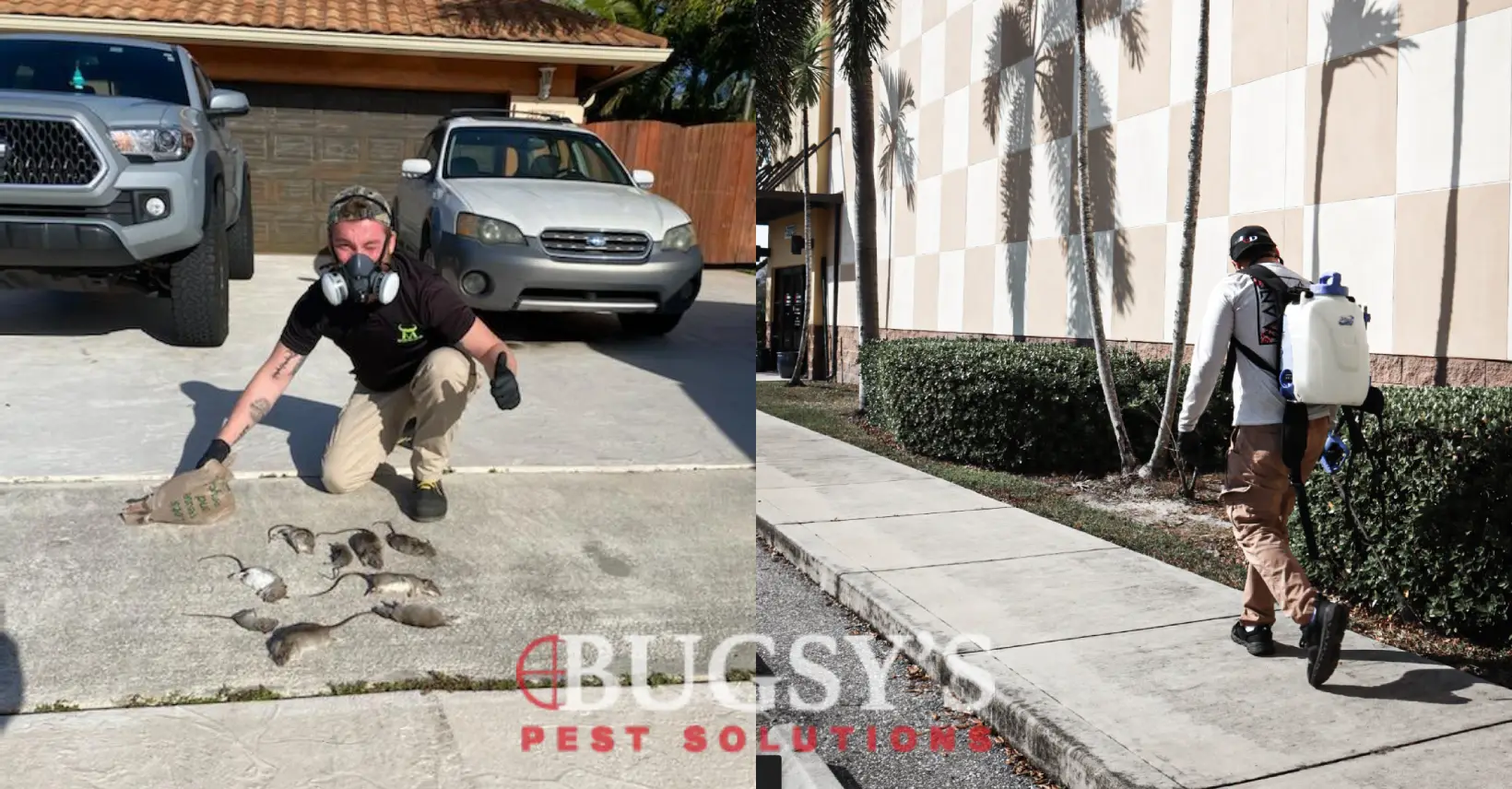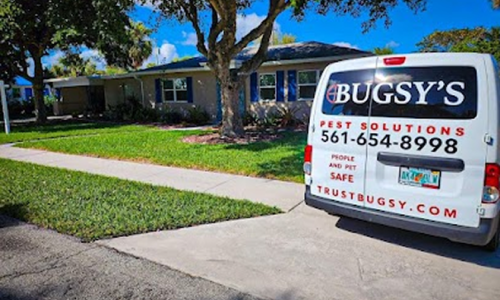Frequently Asked Questions
Do it yourself pest control in West Palm Beach FL?
Do-it-yourself pest control in West Palm Beach, FL, can be effective for minor infestations but often lacks the expertise and targeted solutions that professionals, like TrustBugsy, provide. It's essential to use the right products safely to ensure lasting results.
What are effective DIY pest control methods?
Effective DIY pest control methods include using natural repellents like vinegar or essential oils, maintaining cleanliness to eliminate food sources, sealing entry points, and employing traps for specific pests. These approaches can help manage minor infestations in your home.
How to identify pests in West Palm Beach?
Identifying pests in West Palm Beach involves observing common signs such as droppings, nests, or damage to property. Familiar pests like cockroaches, ghost ants, and roof rats have distinct characteristics that can aid in identification.
Which pests can DIY methods treat effectively?
DIY methods can effectively treat common household pests such as ants, cockroaches, and spiders. For minor infestations, these approaches often provide a temporary solution, but persistent issues may require professional pest control services like those offered by TrustBugsy.
What are safe DIY pest control products available?
Safe DIY pest control products available include diatomaceous earth, essential oils like peppermint and tea tree, and vinegar solutions. These natural options can effectively deter pests without harmful chemicals, making them suitable for homes and families.
How to prevent pest infestations in homes?
Preventing pest infestations in homes involves maintaining cleanliness, sealing entry points, and reducing moisture. Regularly inspect for signs of pests and consider professional pest control services for proactive measures to safeguard your home.
What tools are needed for DIY pest control?
The tools needed for DIY pest control include insect traps, sprays, baits, gloves, and protective eyewear. Additionally, a vacuum, caulk for sealing entry points, and a dust applicator can enhance your effectiveness in managing pests.
How often should I apply pest control treatments?
The frequency of pest control treatments depends on the specific pests and environmental factors. Generally, it’s recommended to schedule treatments every 1-3 months for optimal protection and prevention against infestations.
Are DIY pest control methods cost-effective?
DIY pest control methods can be cost-effective initially; however, they may lack the thoroughness of professional treatments, potentially leading to recurring pest issues that can become more expensive over time.
What precautions should be taken during DIY treatments?
Precautions for DIY treatments include wearing protective gear, ensuring proper ventilation, carefully reading product labels, and keeping pets and children away from treated areas to ensure safety and effectiveness.
How to assess pest problems before treatment?
Assessing pest problems before treatment involves identifying the type of pest, inspecting the affected areas for signs of infestations, and evaluating the extent of the problem. This information helps in choosing the most effective treatment strategy.
Can I combine DIY methods with professional services?
Combining DIY methods with professional services can be effective for pest control. While DIY treatments can help manage minor infestations, professional services ensure thorough inspection and targeted solutions for more significant pest challenges.
What indoor pests can I control myself?
You can control various indoor pests yourself, including ants, roaches, spiders, and some types of flies. Simple methods such as cleanliness, traps, and home remedies can help manage these common invaders effectively.
How can I maintain a pest-free home?
Maintaining a pest-free home involves regular cleaning, sealing entry points, and proper food storage. Additionally, consistent inspections and prompt treatment of any infestations are crucial for effective pest management.
What are the signs of a serious infestation?
The signs of a serious infestation include visible pest droppings, nests, or carcasses, strange odors, increased sightings of pests, and damage to property or food sources. If you notice these, it's time to seek professional help.
How to handle pests without chemicals?
Handling pests without chemicals involves using natural remedies such as diatomaceous earth, essential oils, and traps. Additionally, practicing good sanitation and sealing entry points can effectively deter pests while maintaining a chemical-free environment.
What common mistakes to avoid in DIY pest control?
Common mistakes to avoid in DIY pest control include using incorrect products, neglecting thorough inspections, and failing to follow safety guidelines. These oversights can lead to ineffective treatments and potential harm to people and pets.
Is seasonal treatment necessary for West Palm Beach?
Seasonal treatment is essential for effective pest control in West Palm Beach. The region's warm climate fosters year-round pest activity, making routine treatments necessary to prevent infestations and protect your home or business.
Are there local regulations for DIY pest control?
Local regulations for DIY pest control do exist and may vary by area. It's important to check with your local authorities to ensure compliance with any laws or restrictions regarding pest control products and methods used in your region.
What is the best time for DIY pest control?
The best time for DIY pest control is during the spring and early summer when pests are most active. This timing allows for effective treatment before infestations take hold, ensuring your home remains pest-free.
How to read pest control product labels?
Reading pest control product labels involves understanding key sections, including the active ingredients, usage instructions, safety precautions, and environmental impact. Always follow label directions to ensure effective and safe application for your pest control needs.
What DIY traps are most effective for rodents?
The most effective DIY traps for rodents include snap traps, which quickly kill the pest, and glue traps, which immobilize them. Additionally, bait stations with non-toxic bait can attract and capture rodents safely.
How to treat lawns for pest problems?
Treating lawns for pest problems involves a combination of cultural practices, chemical treatments, and monitoring. Regularly inspect for signs of pests, maintain healthy grass through proper watering and mowing, and apply targeted pest control products as needed for effective management.
Can essential oils be used for pest control?
Essential oils can be used for pest control. Some oils, like peppermint and tea tree, possess natural insect-repelling properties, making them effective against common pests. However, for severe infestations, professional pest control services may be more effective.
What are efficient bait strategies for ants?
Efficient bait strategies for ants involve using protein-rich baits for workers and sugar-based baits for scouts, placing them near ant trails, and ensuring they are accessible to the colony without disturbances to maximize recruitment and consumption.
How to store pest control supplies safely?
Storing pest control supplies safely involves keeping them in a cool, dry place away from children and pets, ideally in their original containers with labels intact. Always secure them in a locked cabinet or storage area to prevent accidental access.
What should I do if DIY fails?
If DIY pest control efforts fail, the best course of action is to contact a professional pest control service like TrustBugsy. They can accurately assess the situation and provide effective, safe treatments tailored to your specific pest problem.
How to dispose of pest infestations quickly?
To dispose of pest infestations quickly, contact a professional pest control service like TrustBugsy. They provide tailored treatment plans that ensure efficient and safe eradication of pests, helping restore your space with minimal disruption.
What is the lifespan of homemade pest control solutions?
The lifespan of homemade pest control solutions varies based on their ingredients and storage conditions. Typically, these solutions are most effective when freshly made and can last anywhere from a few days to a few weeks when stored properly.
How does climate affect pest control strategies?
Climate significantly influences pest control strategies by affecting pest populations, their behavior, and the effectiveness of treatments. In warmer, humid conditions like those in West Palm Beach, pests such as cockroaches and ants thrive, necessitating tailored control measures.

















